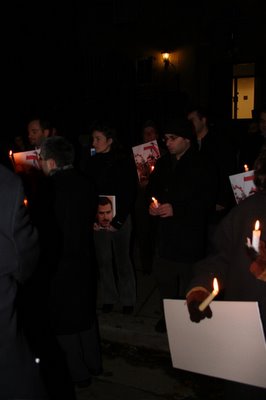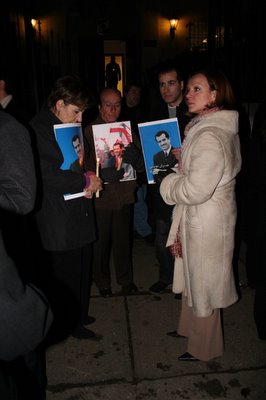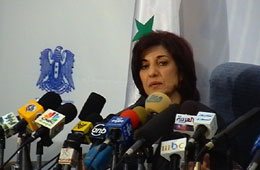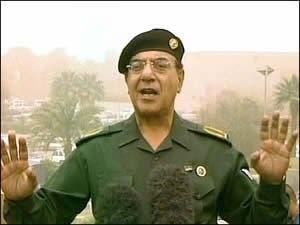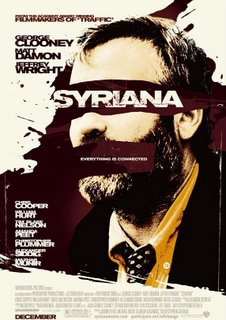Michael Young makes the case for Lebanon in the Wall Street Journal...Since it needs a subscription I thought I'd make it available. A good follow up, granted much more eloquant, to my "Bashar Wins This Round" piece. Young starts out by saying, "For the first time in months, Syrian President Bashar Assad can relax."
'Don't Go Wobbly, George'
By MICHAEL YOUNG
December 23, 2005; Page A14
BEIRUT -- For the first time in months, Syrian President Bashar al-Assad can relax. After facing international pressure for its presumed role in the Feb. 14 assassination of former Lebanese Prime Minister Rafik Hariri, Syria last week made the U.N. Security Council blink. The consequences will be felt hardest in Lebanon, which has yet to break free from Syria's stranglehold. Unless the Bush administration and its European allies, particularly France, reverse this trend, they risk losing everything they have worked for in the country during the past year.
.
When Detlev Mehlis, the German prosecutor tasked by the Security Council to investigate Hariri's assassination was appointed last May, he found himself in a unique position: Never before had the U.N. body overseen an inquiry into a political murder. However, that atypical international audacity showed its limitations when, after Mr. Mehlis's second progress report in mid-December, the Council passed an anemic resolution against Syria; this despite Mr. Mehlis's describing Syrian "reluctance and procrastination" in cooperating with his inquiry, and the fact that on the day the document came out another murder was committed in Beirut -- that of journalist Gebran Tueni, a critic of Syria.
.
Security Council Resolution 1644 was a disappointment on many levels. It extended the U.N. inquiry for six months, but effectively complicated two key Lebanese government objectives: The government had wanted the Council to endorse a tribunal "with an international character" to try suspects in the Hariri assassination; what it got, instead, was a request that Beirut define its needs in that regard. The government also asked that the U.N. inquiry be enlarged to cover other assassinations and bombings that have taken place in recent months. Its reward was a vague clause saying the U.N. and Lebanon might discuss "recommendations" to that effect.
Detlev Mehlis
.
The first condition emasculated the tribunal proposal because Syria's Lebanese allies, particularly Hezbollah, refuse to endorse a mixed or international court, knowing a Lebanese court could never indict Syrians. That means any official Lebanese attempt to meet the U.N. demand might provoke domestic dissension. The vagueness on the inquiry's scope, meanwhile, means assassinations may continue with impunity, because Lebanon's judiciary and security services, where Syrian influence remains strong, will not seriously investigate political crimes without international cover and encouragement. It did not help the somber mood in Lebanon that Mr. Mehlis, who opposed widening the commission's latitude, also acknowledged the recent crimes were probably linked to the Hariri case.
.
The Security Council's indolence was further confirmed when a proposal to ask the U.N. commission to report on its progress every two months was amended, so that now it need only report every three months.
.
The Lebanese worry that the Bush administration has cut a deal, whereby Syria will give it assistance in Iraq and elsewhere in exchange for breathing space in Lebanon. There is little solid evidence for this, but the complexities of a Security Council investigation are becoming all too apparent: To retain unanimity in the Council, the U.S. and France have ceded much ground to Russia and China, who hesitate to punish Syria. Russia in particular fears that collapse of the Assad regime might lead to chaos, and is backed in this by the Arab states. In Washington, where Iraq withdrawal mode has taken over, "realists" enamored with stability are making a comeback, and also seem to prefer Mr. Assad to the unknown.
.
Getting cold feet on Syria would render the Security Council's year-long efforts in Lebanon invalid. It would also make a mockery of the Bush administration's stated aim that it seeks behavior change in Damascus. Syrian behavior in Lebanon has indeed changed, but for the worse. The Hariri investigation was designed to end political killings. If so, the families of Tueni, Samir Kassir and George Hawi, as well as those of several other bombing victims, would disagree.
.
The international community cannot continue backing a U.N. investigation of the Syrian regime while also saving Mr. Assad's bacon. Something has to give, and unless the contradiction is ironed out quickly, it will infect the work of the U.N. commission. If the Security Council is serious about finding Hariri's murderers, then it must use the instruments it has itself approved to compel Syria to cooperate with the inquiry, including sanctions. After all, Resolution 1644 and a strongly worded predecessor, Resolution 1636, were passed under Chapter 7 of the U.N. Charter.
.
His contract expired, Mr. Mehlis is returning to Berlin, reportedly to be replaced by a capable young Belgian prosecutor, Serge Brammertz. The U.N. investigation is moving forward and Syrian responsibility for the crime is in little doubt. (Asked by a London-based Arabic newspaper whether he was convinced Syria was behind Hariri's killing, Mr. Mehlis replied, "Yes.") But time is a key factor, and it would be strange for investigators to methodically investigate the Hariri killing, while others continue unabated. A reminder: Tueni died just meters from the road U.N. investigators take to Beirut daily.
.
Beyond the likelihood of more assassinations, the Security Council ignores another thing: Finding Hariri's assassins was always a cornerstone of efforts to dismantle the Syrian political and security edifice in Lebanon. That is largely intact. Syrian allies, most prominently Hezbollah, are armed, and while its disarmament (also demanded by the Security Council) must be the fruit of domestic Lebanese dialogue, its leadership will not negotiate unless Syria's sway in Lebanon is broken.
.
As long as the international community refuses to address a change of power in Syria, and as long as powerful states cretinously assume that the Syrian regime is a mainstay of stability, Mr. Assad will survive. This will lead to his trying to reassert Syria's hold over Lebanon, provoking serious instability between his enemies and allies here. Syrian stability passes through Lebanese instability, so any presumption that the men in Damascus are a force for regional serenity is misguided.
.
If the Security Council is to be consistent with its aims in the Hariri case, it must use the next two months to definitively determine if Syria is serious about cooperating with the U.N. inquiry. If it is not, the Council has a basket of policy choices: It can impose sanctions on senior Syrian officials, or on the economy as a whole, including oil exports. It can issue a new resolution that places the burden of forming an international or mixed tribunal on the U.N.'s shoulders, rather than on that of the Lebanese. And it can expand the U.N. commission's mandate to include all recent political crimes, on the grounds that these are extensions of the Hariri affair.
.
As for the U.S., it seems odd that only days after Secretary of State Condoleezza Rice wrote in the Washington Post that democratic institutions, especially in the Middle East, were "the only realistic response to [America's] present challenges," the administration should sign off on a U.N. resolution suggesting the contrary. Lebanon, like Iraq, is that rare country that has proven Mr. Bush right in pursuing regional democracy. He shouldn't have so easily averted his gaze when a bright light of Lebanese liberalism was butchered last week. Maybe it's time for the president to hear what his father heard from Maggie Thatcher after the Iraqi invasion of Kuwait: "Don't go wobbly, George."
.
Mr. Young, a Lebanese national, is opinion editor at the Daily Star in Beirut and a contributing editor at Reason magazine.









